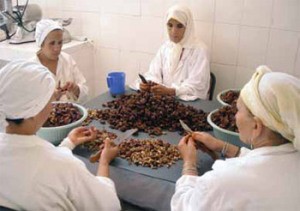
The syrupy odor of date jelly pervades the Al Ouaha cooperative, located in the Errachidia province in southern Morocco.
The cooperative grows date palm trees, and harvests and processes the fruit. But the oasis faces challenges including water scarcity, plant diseases, land fragmentation, rural migration, poverty, and lack of employment opportunities.
USAID, in conjunction with the Moroccan National Initiative for Human Development, is addressing the challenges in this arid, impoverished region by reaching out to residents of the Errachidia region.
Through its Local Governance Program, implemented by the Research Triangle Institute, the Agency held 68 public forums to ask residents about their needs. In these forums, local citizens identified jobs-particularly for women-as a priority. With the expressed needs in mind, USAID began providing financial assistance and training to local cooperatives to help them expand their businesses.
“The technical skills we learned about the quality and marketing of our products were very beneficial and our business started to flourish,” said Fatima Nakrat, owner of the mostly female Al Ouaha cooperative. With increased sales of date jelly, the cooperative has added other products, including aromatic and medicinal plants and olive oil. “We have even employed an additional 20 women and 10 men,” said Nakrat.
A nearby cooperative, Ezrigat, also receives USAID funding and employs 40 men and five women. Manager Mohammed Boustaba said that “the project has brought us new skills-we only knew how to make date jelly, tahlaout, produced by our grandparents. Now, we have learned to produce other date products such as jam and tartine.”







Comment
Make a general inquiry or suggest an improvement.